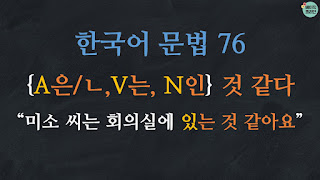EPS-TOPIK Grammar: the Korean Standard Textbook 2: Chapter 31 (1) - A/V지만
Hello~Welcome to Basic Korean.
In summary,
In this lesson, we're going to learn EPS-TOPIK grammar 'A/V지만' from the Korean Standard Text Book 2 (한국어 표준교재 2) Chapter 31. Please refer to the grammar on page 17.
If you want to listen to this lesson in Korean (with English subtitles), please watch the below video.
🎬 EPS-TOPIK Grammar Video 31(1) 'A/V지만': https://youtu.be/4DciRR-0R24
✨EPS-TOPIK Grammar 31-1: A/V-지만
(You can have this post in Korean.)
Let's look at examples first and see how today's grammar is used.
[Translation]
- 나나 (Nana): "우리 고향은 일 년 내내 더운데, 한국은 씨가 어때요?" "
My hometown is hot all year round, how is the weather in Korea?"
My hometown is hot all year round, how is the weather in Korea?"
- 미소 (Miso): "한국은 여름에는 덥지만 겨울에는 추워요."
Korea is hot in summer but cold in winter
Here, today's grammar we're going to learn is '덥지만' Let's look at today's grammar!
- '지만?' attaches after an adjective/verb stem.
- It is used to connect two sentences that have opposite meanings.
Let's look at two example sentences.
⇨ '한국은 여름에는 더워요. + 겨울에는 추워요.
(Korea is hot in summer.) + (It is cold in winter.)
(Korea is hot in summer.) + (It is cold in winter.)
⇨ 더워요. (It's hot.) and 추워요. (It's cold). They have the opposite meaning.
⇨ Two sentences have the opposite meaning and when you want to talk in one sentence. you can connect them by using '지만'.
⇨ So you can say, "한국은 여름에는 덥지만 겨울에는 추워요."
 |
| Korean Grammar 'A/V지만' Example |
✎ 한국은 여름에는 습하지만 겨울에는 건조해요.
(Korea is humid in summer but dry in winter.)
⇨ '한국은 여름에는 습해요. + 겨울에는 건조해요.
(It's humid in summer in Korea.) + (It's dry in winter.)
(It's humid in summer in Korea.) + (It's dry in winter.)
⇨ 습해요 (It's humid.) and 건조해요 (It's dr). They have the opposite meaning.
- Whether an adjective/verb stem has the final consonant or not, '지만' is used.- an adjective 덥다 (to be hot) + 지만 ➝ 덥지만
- When you remove '다', there is the final consonant 'ㅂ' in '덥.'
- Add '지만'
- So it becomes '덥지만.'
- an adjective 습하다 (to be hot) + 지만 ➝ 덥지만
- When you remove '다', there is no final consonant.
- Add '지만'
- So it becomes '습하지만.'
※ (Noun)이다 ➝ (Noun)이지만
- In the case of 'Noun이다' that combines a noun and '이다',
➝ you can say 'Noun-이지만'
- 학생이다 ➝ 학생이지만
- 학생이다 (to be a student)' which is a combination of a noun '학생 (student)' and '이다,'
- Remove '다', there is no final consonant in '이.'
- Add 지만.
- So it becomes '학생이지만.'
 |
| Korean Grammar Combination chart: 지만 |
4. the subject = (the subject)
- When the subject of the following sentence is the same as the preceding sentence, you can drop the subject of the following sentence.
✎ 여름은 덥지만 건조해요. (Summer is hot but dry.)
⇨ 여름은 더워요. (Summer is hot.) + 여름은 건조해요. (Summer is dry.)
⇨ The subject of both sentences is '여름 (summer).
⇨ And when you connect two sentences using '지만', drop the subject of the second sentence.
⇨ So, you can say '여름은 덥지만 건조해요.
5. Past Tense: 았지만/었지만/했지만
- When you talk about the past, you can use '았지만, 었지만, 했지만.'
✎ 어제는 기온이 높았지만 오늘은 기온이 낮아요.
(The temperature was high yesterday, but it's low today.)
⇨ Let's connect 어제는 기온이 높았어요. (The temperature was high yesterday.)
and 오늘은 기온이 낮아요. (The temperature is low today.)
and 오늘은 기온이 낮아요. (The temperature is low today.)
⇨ 어제는 기온이 높았어요 is the past form.
⇨ So when you connect two sentences using '지만', '지만' is used after the past marker '았.'
⇨ So, you can say '어제는 기온이 높았지만 오늘은 기온이 낮아요.'
6. Examples
- 오늘은 날씨가 맑지만 내일은 비가 올 거예요.
(It's sunny today, but it's going to rain tomorrow.) - '지만' attaches after the adjective 맑다 (to be sunny).
- So '맑다' becomes '맑지만.'
- 낮에는 기온이 올라가지만 밤에는 기온이 내려갈 거예요.
(The temperature will rise during the day, but it will go down at night.) - '지만' attaches after the verb '올라가다 (to increase).'
- So '올라가다' becomes '올라가지만.'
- 어제는 따뜻했지만 오늘은 추울 거예요.
(It was warm yesterday, but it will be cold today.) - '했지만' attaches after the adjective '따뜻하다 (to be warm).'
- Because it is talking about yesterday's weather, '했' is used after '지만.'
- So '따뜻하다' becomes '따뜻했지만.'
Let's look at another short conversation.
The [Sky Blue] is pronunciation.
 |
| Example of '지만' |
[Translation]
- 나나 (Nana): "미소 씨, 주말인데 어디에 가요?"
Miso, it's weekend. Where are you going?
Miso, it's weekend. Where are you going?
- 미소 (Miso): "회사의 가요. 일이 많아서 주말이지만 회사에 가서 일해야 돼요.
I'm going to work. Even though it's weekend, I have lots of work to do, so I need to go and work.
I'm going to work. Even though it's weekend, I have lots of work to do, so I need to go and work.
- '주말이지만' is a combination of '주말이다 (to be weekend' and '지만.''
Today, we've learned 'Adjective/verb-지만.'
Here are the related videos on Youtube.
🎬EPS-TOPIK Vocabulary 31-1 Weather: https://youtu.be/LDx0_9pkPvg
🔗 Download: http://www.hrdkorea.or.kr/3/3/3/1/2
(The standard textbook for EPS-TOPIK (Download) Please download '개정판 (revised edition))
🔗 E-Book: http://eps.hrdkorea.or.kr/epstopik/book/self/ebookIndex.do?lang=ko
That's all for today. Thank you~!








_basickorean.jpg)

